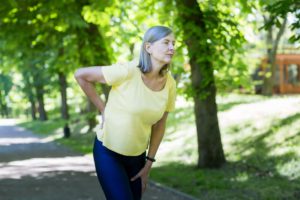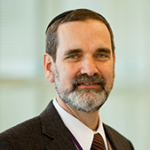
Many women suffer from low back pain, but they may not know how it all began. Some of the women know exactly where it started, starting with pregnancy and never going away. There is new research on how childbirth impacts low back pain later in life, which may surprise some people.
In the January 2023 issue of the journal BMC Women’s Health, researchers share their findings after studying 1,069 women from a pain management clinic [1]. The study sought to determine if there is a link between childbirth and women having chronic low back pain later in life.
Like what you’re learning? Download a brochure for our online, postgraduate pain medicine certificate or master’s degree program in partnership with the Keck School of Medicine of USC.
The study found that women who had given birth had a higher risk for chronic low back pain later in life than women who had never given birth. This was even after correcting for age, race, weight, etc. Women who reportedly had experienced acute postpartum back pain had a higher prevalence of chronic low back pain later in life. They also found that 28% of the women who experienced acute postpartum back never had it go away, and 40% felt it was never fully resolved.
This is essential research for those who are working with women who are pregnant or postpartum. If the women are experiencing acute back pain, there is a good chance they will continue to share it later in life. Finding good management tools early on is essential to keep them from diminishing their quality of life over time.
The good news is that there are numerous tools that women can use to help manage chronic low back pain. In the October 2022 issue of the journal Cureus, researchers looked at various integrative methods to help manage chronic pain [2]. The methods include massage therapy, acupuncture, and yoga.
Putting each of the methods to the test to see if they help with chronic pain, they found that each of them helped to reduce chronic pain. In fact, they concluded that there was a significant reduction in chronic pain from using these integrative approaches, with all of them helping people achieve pain relief without the use of pharmaceuticals.
Massage therapy, acupuncture, and yoga are all tools that women can turn to when seeking chronic pain relief. Each of the options is affordable and easily accessible in most areas. Those who need affordable massage therapy options may consider looking into a nearby school where they can receive low-cost massages from students under the supervision of a teacher. Those who want to try yoga can do it without leaving home by pulling up some beginner videos on YouTube.
Earn an Online Postgraduate Degree in Pain Medicine
Like what you’re learning? Consider enrolling in the Herman Ostrow School of Dentistry of USC’s online, competency-based certificate or master’s program in Pain Medicine in partnership with the Keck School of Medicine of USC.
Sources:
- BMC Women’s Health. Association between a history of childbirth and chronic, functionally significant back pain later in life. January 2023. https://pubmed.ncbi.nlm.nih.gov/36597120/
- Cureus. The Benefits of Integrative Medicine in the Management of Chronic Pain. October 2022.
